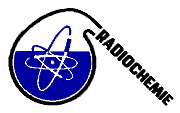Speaker
Dr
Verónica Elizabeth BADILLO-ALMARAZ
(NATIONAL INSTITUTE OF NUCLEAR RESEARCH)
Description
Rhenium-188 is a recommended radioisotope for diagnostic and therapeutic techniques because of its attractive physical and chemical properties: half-life 16.98 hours, a strong particulate emission (beta energy of 2.12 MeV) and an imageable gamma emission (15 %, 155 keV) ideal for current gamma camera imaging of tumors. Radiopharmaceuticals labeled with 188Re are currently used in clinical trials, such as: 188Re-MAG3 as renal excreting agents, 188Re-HEDP for palliation of metastatic bone pain) or188Re-HDD for treatment of liver cancer.188Re is the daughter product of 188W/188Re generator with a useful shelf-life of several months and can continually provide a supply of 188Re to remote sites at a reasonable cost. In these generators 188W is adsorbed on alumina, charged in a chromatography column, and 188Re is eluted with saline solution. A systematic study of W and Re sorption on alumina as a function of the medium concentration, medium pH, alumina particle size and alumina weight (capacity) and an evaluation of the performances of the 188W/188Re generator systems constructed from the W and Re adsorption data are reported. Re-188 is not adsorbed in HCl and NaCl medium whereas W-188 is strongly adsorbed in both media at pH < 5.5. In accordance with the W and Re adsorption results, alumina 188W/188Re generators can be prepared and eluted with HCl ( < 0.1 mol/L) and 0.9 % NaCl solutions (pH <5.5), using alumina with a particle size of 0.075-0.048 mm and a ratio of 10.5 mg W/ g alumina, at this ratio the W is sorbed about 99.9% on alumina and the Re around 3 %. Alumina based 188W/188Re generators eluted with HCl or 0.9 % NaCl solutions and with ratios of 10 or 20 mg W/ g alumina were prepared and evaluated for six months. Optimum performances were obtained in the generator eluted with 0.9 % NaCl solutions, a ration of 10 mg W/ g alumina and 188W fixed with 0.01 mol/L HCl: 188Re elution yields of 83 %, a 188W breakthrough of 4.5x10-4 %, a radiochemical purity of 92 %, an eluate volume and pH of 8.3 mL and 5.5 respectively and an aluminum content of less than 10 g/cm3.
Primary author
Dr
Fabiola MONROY-GUZMAN
(NATIONAL INSTITUTE OF NUCLEAR RESEARCH)
Co-authors
Ms
C.J. ROSALES
(NATIONAL INSTITUTE OF NUCLEAR RESEARCH)
Dr
Verónica Elizabeth BADILLO-ALMARAZ
(NATIONAL INSTITUTE OF NUCLEAR RESEARCH)

